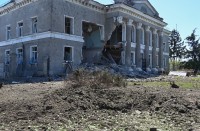AUGUST 18 (Reuters) — Thai Prime Minister Prayuth Chan-ocha said on Tuesday (August 18) that authorities were looking for a “suspect” seen on closed-circuit television (CCTV) footage near the site of a bomb blast that killed 22 people, including eight foreigners.
“We have checked the closed circuit camera footage and there appears to be a suspect but it wasn’t clear. We have to investigate more,” Prayuth told reporters at Bangkok’s Government House.
Officials have not blamed any group for the bombing at the Erawan shrine, which the government called a bid to destroy the economy. No one has claimed responsibility.
Three Chinese were among the dead, China’s official Xinhua news agency said. Two Hong Kong residents, two people from Malaysia and one person from the Philippines also died, officials said. Scores of people were wounded, including many from China and Taiwan.
Prayuth told reporters there were “still anti-government groups out there” but gave no further details.
“After the explosion, there are many rumors (online) saying there might be a network behind this. We will find this network but I haven’t ruled out any possibility yet,” he said.
The Deputy Prime Minister overseeing national security, Prawit Wongsuwan said the attack, which took place during rush hour in the capital’s bustling commercial hub, was unprecedented in Thailand.
“We did not expect this kind of attack to be carried out in a crowded area, in a manner that is aimed to destroy tourism and the country’s economy,” said Prawit.
Thailand has been raven for a decade by a sometimes violent struggle for power between political factions in Bangkok.
Occasional small blasts have been blamed on one side or the other. Two pipe bombs exploded outside a luxury shopping mall in the same area in February, but caused little damage.
Thai forces are also fighting a low-level Muslim insurgency in the predominantly Buddhist country’s south, but those rebels have rarely launched attacks outside their heartland.
The Erawan shrine, on a busy corner near top hotels, shopping centers, offices and a hospital, is a major attraction, especially for visitors from East Asia, including China. Many Thais also worship there.
Tourism is one of the few bright spots in an economy that continues to underperform more than a year after the military seized power in May 2014.
It accounts for about 10 percent of the economy, and the government had expected a record number of visitors this year following a sharp fall in 2014 during months of street protests and the coup.







